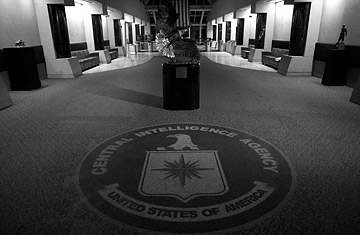
Amid all the back-and-forth recriminations over the abusive CIA interrogations, one crucial fact is being overlooked; when the use of harsh techniques like waterboarding and prolonged sleep deprivation began in 2002, the CIA simply had no idea what it was doing.
The agency's officers in Vietnam who understood hostile interrogations were long retired. In the post-Cold War era spying had become a relatively genteel occupation — the best intelligence was obtained through persuasion rather than coercion. New CIA recruits were even counseled against using blackmail because the information it produced couldn't be relied upon. So it shouldn't come a surprise when we hear self-confessed 9/11 mastermind Khalid Sheikh Mohammed was waterboarded 183 times in one month. The CIA interrogator, who was once my colleague, knew nothing about the cumulative effect of the practice, or if there was a law of diminishing returns. (See pictures from inside Guantanamo Bay.)
And it's also no surprise, then, that CIA brass weren't exactly excited about this new directive. (Of course, it's also no surprise they would claim that now either.) One former CIA officer who was part of the discussions that led to the waterboarding of Abu Zubaydah in 2002 told me that much of CIA management was dead set against the agency taking on the task. Among other objections, they felt that the military was better equipped to deal with interrogating prisoners of war; the military, after all, had its own interrogation school. But, as the message came down, then Secretary of Defense Donald Rumsfeld, apparently aware of the potential political firestorm that would result, had grown nervous about the Pentagon's initial involvement.
I asked the former CIA officer the question that former Vice President Dick Cheney wants more of a focus on these days — whether the abusive interrogations worked. To a degree, he said. Through the course of the interrogations of Mohammed, Abu Zubaydah and other al-Qaeda prisoners the CIA learned a lot more than it knew before about al-Qaeda communications, its use of safe houses, codes, and the way al-Qaeda looks at the world. In other words, pretty much all low-level stuff. He said there were no dramatic confessions he knew of, the kind we see virtually every week in the popular TV show 24 that prevent a catastrophic attack in the nick of time.
Last Sunday former CIA Director Michael Hayden argued that abusive interrogations do indeed work. He cited the arrest of a mid-level al-Qaeda member who helped coordinate 9/11, Ramzi bin al-Shibh. According to Hayden, Abu Zubaydah gave up the name after being waterboarded. This may be true, but the deeper question is, Was it worth the candle? Isn't all of the international condemnation, not to mention the demoralization of the CIA, too high a price to pay for the arrest of a mid-level al-Qaeda operative? (See pictures of the aftermath of Abu Ghraib.)
The real verdict on the value of such harsh interrogations can be gleaned from their origins, which top Bush Administration officials didn't even know about, according to the New York Times. The techniques the CIA drew on ultimately go back to an article written for the Air Force about Chinese torture techniques during the Korean War, entitled "Communist Attempts to Elicit False Confessions from Air Force Prisoners of War." As the title indicates, the Chinese intent was to produce false confessions, not obtain vital intelligence.
What is now clear is that the CIA was drawn haphazardly into abusive interrogation, haphazardly fell back on vague ideas of torture, and ended up with with the vaguest results. It all reflects a White House under extreme pressure after 9/11, giving orders to a compliant CIA to do something, anything, to try to prevent another such attack.
Baer, a former CIA field officer assigned to the Middle East, is TIME.com's intelligence columnist and the author of See No Evil and, most recently, The Devil We Know
